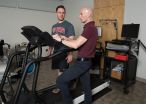"Changes in mental functions and capabilities are a part of aging and occur with everyone," said committee chair Dan G. Blazer, the J.P. Gibbons Professor of Psychiatry Emeritus at Duke University Medical Center in Durham, N.C. "The extent and nature of these changes vary widely and are gradual, and aging can have both positive and negative effects on cognition. Wisdom and knowledge can increase with age, while memory and attention can decline."
Aging can affect cognitive abilities needed to perform daily tasks, such as driving, following recipes, adhering to medication schedules, and paying bills, the committee said. As they get older, individuals of all ages should take the following three steps to help promote cognitive health: Be physically active. Reduce and manage cardiovascular disease risk factors, including high blood pressure, diabetes, and smoking. Regularly discuss and review health conditions and medications that might influence cognitive health with a health care professional. A number of medications can have a negative effect -- temporary or long term --on cognitive function when used alone or in combination with other medication.
Other actions that may promote cognitive health: Be socially and intellectually active, and continually seek opportunities to learn. Get adequate sleep and seek professional treatment for sleep disorders, if needed. Take steps to avoid a sudden acute decline in cognitive function, known as delirium, associated with medications or hospitalizations. Carefully evaluate products advertised to consumers to improve cognitive health, such as medications, nutritional supplements, and cognitive training.
Communities, nonprofit organizations, and businesses can play a significant role in developing partnerships and programs to help aging individuals take charge of their cognitive health. The report noted that health care professionals need to be prepared to provide guidance to older adults and their families as the patient population ages.
There has been considerable interest over the past several years in whether cognitive stimulation -- either through formal training or everyday activities, such as completing crossword puzzles, participating in a book club, playing card games, or learning to play a musical instrument -- can assist in the maintenance or even enhancement of cognitive function. The scientific literature on cognitive stimulation and cognitive training has shown that older adults can improve on trained abilities, albeit often at a slower pace than younger adults, and that improvements on the tasks can be maintained over time. However, studies examining whether cognitive stimulation and training could transfer to real-world activities and tasks have had mixed results. For example, can a computer-based memory training program help people better remember their shopping list, medical and other appointments, and the names and faces of new acquaintances? Claims regarding the effectiveness of cognitive aging related products require careful evaluation by consumers and in regulatory review, the committee said.
Despite widespread publicity about the benefits of vitamins and supplements for brain health and the large expenditures made on these products for a wide variety of reasons, the evidence for supplements enhancing cognition or preventing decline is limited, and the medical literature does not convincingly support any vitamin supplement intervention to prevent cognitive decline, the report says.
The report emphasizes that cognitive aging has significant impacts and widespread consequences on society, including financial losses. Older adults lose an estimated $2.9 billion a year, directly and indirectly, to financial fraud. To provide necessary assistance and support to older adults, the committee called for the development of cognitive aging information resources and tools that can help individuals and families. Programs and services used by older adults, including those in financial institutions and departments of motor vehicles, should be improved to help them avoid exploitation, optimize independence, and make sound decisions. For example, the financial services industries and relevant state and federal agencies should implement systems approaches, training, and laws and regulations to help verify that financial transactions are not fraudulent or the result of diminished decision-making capacity or undue influence.
"We are only really beginning to understand how the brain changes with age," said Victor Dzau, president of the Institute of Medicine. "As the population of older Americans grows, so will the effects of cognitive aging on society. By calling attention to this issue, we can learn more about the risk and protective factors and needed research so older adults can better maintain their cognitive health to the fullest extent possible."
INFORMATION:
The study was sponsored by the McKnight Brain Research Foundation, National Institutes of Health (National Institute of Neurological Disorders and Stroke and National Institute on Aging), Centers for Disease Control
and Prevention, Retirement Research Foundation, and AARP. Established in 1970 under the charter of the National Academy of Sciences, the Institute of Medicine provides independent, objective, evidence-based advice to policymakers, health professionals, the private sector, and the public. The National Academy of Sciences, National Academy of Engineering, Institute of Medicine, and National Research Council make up the National Academies. A committee roster follows.
Contacts:
Jennifer Walsh, Senior Media Relations Officer
Chelsea Dickson, Media Relations Associate
Office of News and Public Information
202-334-2138; e-mail news@nas.edu
http://national-academies.com/newsroom
Twitter: @NAS_news and @NASciences
Pre-publication copies of Cognitive Aging: Progress in Understanding and Opportunities for Action are available from the National Academies Press on the Internet at http://www.nap.edu or by calling 202-334-3313 or 1-800-624-6242. Reporters may obtain a copy from the Office of News and Public Information (contacts listed above).
INSTITUTE OF MEDICINE
Board on Health Sciences Policy
Committee on the Public Health Dimensions of Cognitive Aging
Dan G. Blazer, M.D., M.P.H., Ph.D.* (chair)
J.P. Gibbons Professor of Psychiatry Emeritus
Duke University Medical Center
Durham, N.C.
Kristine Yaffe, M.D. (vice chair)
Scola Endowed Chair,
Professor of Psychiatry, Neurology, and Epidemiology
University of California
San Francisco
Marilyn Albert, Ph.D.
Director, Division of Cognitive Neuroscience, and
Professor of Neurology
Johns Hopkins University School of Medicine
Baltimore
Sara J. Czaja, Ph.D.
Leonard M. Miller Professor of Psychiatry and Behavioral Sciences and
Scientific Director, Center on Aging
University of Miami
Miami
Donna Fick, R.N., Ph.D., FGSA, FAAN
Distinguished Professor of Nursing, and
Co-Director
Hartford Center of Geriatric Nursing Excellence
Pennsylvania State University
University Park
Lisa Gwyther, M.S.W., L.C.S.W.
Director, Family Support Program,
Duke University Center for Aging, and
Associate Professor
Department of Psychiatry and Behavioral Sciences
Duke University
Durham, N.C.
Felicia Hill-Briggs, Ph.D.
Professor of Medicine, Physical Medicine, and Rehabilitation
Johns Hopkins University School of Medicine
Baltimore
Sharon K. Inouye, M.D., M.P.H.*
Professor of Medicine and Milton and Shirley F. Levy Family Chair
Harvard Medical School, and
Director, Aging Brain Center
Institute for Aging Research
Hebrew SeniorLife
Boston
Jason Karlawish, M.D.
Professor of Medicine, Medical Ethics, and Health Policy
School of Medicine
University of Pennsylvania
Philadelphia
Arthur F. Kramer, Ph.D.
Director,
Beckman Institute for Advanced Science and Technology, and
Swanlund Chair and Professor of Psychology and Neuroscience
University of Illinois
Urbana-Champaign
Andrea LaCroix, Ph.D.
Director
Women's Health Center of Excellence, and
Professor and Chief of Epidemiology
University of California, San Diego
La Jolla
John H. Morrison, Ph.D.
Dean of Basic Sciences and Graduate School of Biomedical Sciences, and
Professor of Neuroscience
Icahn School of Medicine
Mount Sinai School of Medicine
New York City
Tia Powell, M.D.
Director
Montefiore-Einstein Center for Bioethics
Albert Einstein College of Medicine
Bronx, N.Y.
David B. Reuben, M.D.
Director, Multicampus Program in Geriatric Medicine and Gerontology, and
Chief
Division of Geriatrics
University of California
Los Angeles
Leslie Snyder, Ph.D.
Professor
Department of Communication
University of Connecticut
Storrs
Robert B. Wallace, M.D., M.Sc.*
Irene Ensminger Stecher Professor of Epidemiology and Internal Medicine
College of Public Health
University of Iowa
Iowa City
STAFF
Cathy T. Liverman
Study Director
*Member, Institute of Medicine


